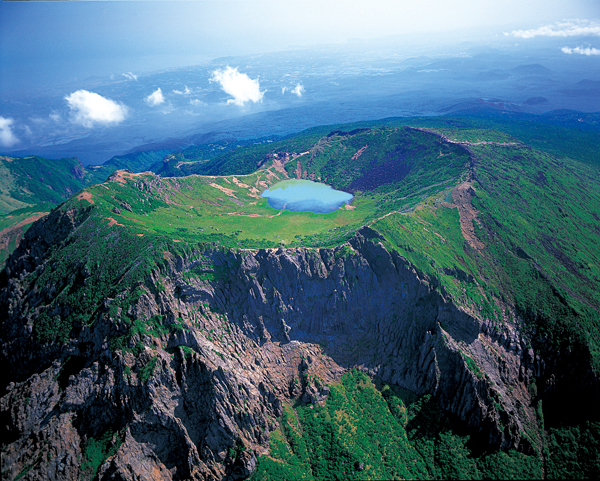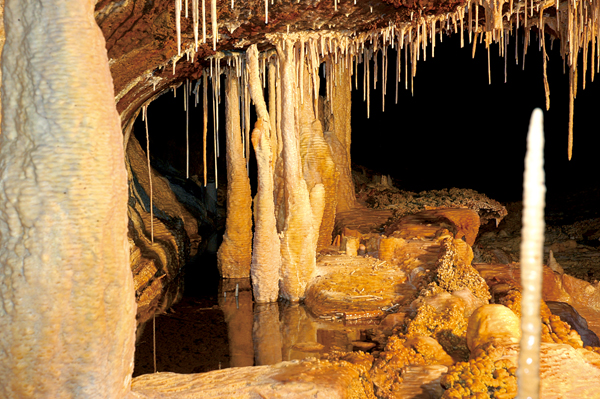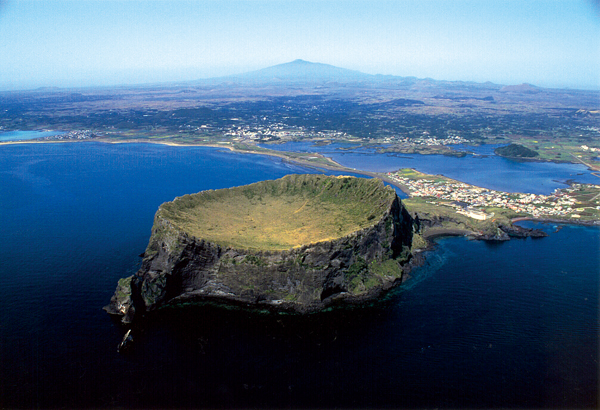
- Updated 2024.4.24 17:16
- All Articles
-
member
icon
-
facebook
cursor
-
twitter
cursor
|
TravelHiking |
Three sites, three yearsAnniversary of UNESCO listing |
|
| |
 |
|
| ▲ The three locations that are included in Jeju Island's listing as a UNESCO World Natural Heritage Site are, from top, Hallasan National Park, the Geomeun Oreum Lava Tube System and Sunrise Peak (Seonsan Ilchulbong). Photos courtesy Jeju Special Self-Governing Province |
On June 27, Jeju marked the third anniversary of gaining World Natural Heritage Site listing for Halla National Park, Sunrise Peak (Seongsan Ilchulbong) and the Geomeun Oreum Lava Tube System. A number of events and programs were planned with some to continue through the summer to commemorate the coveted UNESCO designation. These include the Second International Jeju World Natural Heritage Photography Competition, the 2010 Geomun Oreum trekking competition (from July 10 through Aug. 8), temporary free admission to the three sites and World Natural Heritage Site photo exhibits still on display in Seoul and Jeju.
A two-hour special live broadcast on June 27 by KBS was also part of commemoration programs and, as publisher of the Jeju Weekly, I was invited to be a panelist to discuss the sites and what future steps should be implemented to find effective ways of maintaining a balance between conservation and development. Other panelists were Prof. Seo Young Bae of Seoul National University, who is the first IUCN Asia Regional Committee chairman. Prof. Woo Gyong Sik, a geologist at Gangwon University and a member of the IUCN inspection team; and Lee Ji Hoon, an environmentalist who is director of the World Heritage Research Institute based in Jeju.
The KBS special consisted of two parts - “Jeju’s Natural Treasure” offered live coverage by reporters at each of the designated locations, interviewing visitors and nearby residents at each location. The segments mainly featured the outstanding beauty and biological & geological values of the island’s natural treasures through inter-views and pre-filmed footage of Mount Halla’s landscape and the caves at Geomun Oreum. The second segment, “Jeju Catching the World’s Attention,” featured the panelists assessing the achievements made since the UNESCO classification, discussing ways of better preserving the sites and addressing concerns over management issues, such as visitation and facilities.
“The UNESCO designation proves that Jeju’s nature is not just Jeju’s or Korea’s treasure. It is now the world’s treasure,” Seo said. “But we have to find the wisest way of balancing the contradicting concepts of development and conservation,” he continued, stressing the importance of close collaboration among experts, officials and local residents. Speaking about a controversial plan for a cable car on Mount Halla, and proposals to establish more trekking trails on the sites, he said that “preservation should be the priority.” Responding to the increasing demand for facilities at all sites, however, he said “environmentally sensitive planning and installation is required as we cannot neglect the need to provide convenience for visitors.” He believed that a transparent system needs to be put in place to minimize conflicts when implementing development plans.
Woo said “many visitors and local residents still think Seongsan Ilchulbong is merely a place for viewing the best sunrise at New Year. Only a few seem to recognize the unique geological features of the peak bearing testimony to the history of ancient under-water volcanoes.” The reason, he said, was “a common result of a lack of education and an inadequate tourism program.”
All the panelists shared the view that the phenomenal growth in visitor numbers at the sites was a double-edged sword, with both positive and negative repercussions. The UNESCO designation served as a momentum to reinvigorate Jeju’s economy, in particular Jeju’s tourism sector. Since the listing, according to statistics released by the Jeju provincial government, the number of visitors to the sites has tripled, while the number of foreign visitors has doubled. Most notably, Sunrise Peak averages 5,000 visitors a day, leading many to believe that authorities must take urgent steps to cope with overcrowding.
Lee stated that, “We have to take environmental issues very seriously, such as overcrowding and opening caves that are not currently accessible to the public.” He cited several cases in other countries where status as a World Natural Heritage Site was cancelled due to lack of proper management in line with UNESCO’s preservation criteria. “Every six years, reassessments of World Natural Heritage Sites are made. Who will guarantee that Jeju continue to enjoy that UNESCO status unless we preserve the sites properly?” He emphasized that the ecological treasures should not be viewed solely as a means of making money, despite the obvious importance of socio-economic involvement of those sites.
Having asked for opinions from foreign residents on the island, particularly Jeju Weekly readers and staff, I pointed out the inadequate language service available at these sites, as well as a lack of comprehensive foreign language Web sites for those who want to know more about the sites or Jeju as a whole. The local government is making efforts to publicize Jeju Island through tour guide books and promotional videos, which are updated on a regular basis, and brochures in different languages are on display at all tour sites. However, foreigners who have visited the sites said these publications are not very helpful. Perhaps officials need to incorporate voices from the foreign community to better cater to what international travelers want and use professionals with overseas expertise and global perspectives in their public relations team.
The coveted UNESCO designation has obviously been immensely important for the island’s tourism industry and global recognition. It will become even more important in years to come, especially when Jeju hosts the World Conservation Congress 2012, the biggest conservation conference in the world.
The province also aims to live up to its new slogan of “Environmental Capital of the World,” which encapsulates the island’s vision for the future.
|
|
|
|
|
|
|
 Song Jung Hee의 다른기사 보기 Song Jung Hee의 다른기사 보기 |
|
ⓒ Jeju Weekly 2009 (http://www.jejuweekly.net)
All materials on this site are protected under the Korean Copyright Law and may not be reproduced, distributed, transmitted, displayed, published without the prior consent of Jeju Weekly. |
|
|
|
|
| Jeju-Asia's No.1 for Cruise |
|
|
|
Title:The jeju Weekly(제주위클리) | Mail to editor@jejuweekly.net | Phone: +82-64-724-7776 Fax: +82-64-724-7796
#503, 36-1, Seogwang-ro, Jeju-si, Jeju-do, Korea, 63148
Registration Number: Jeju, Ah01158(제주,아01158) | Date of Registration: November 10,2022 | Publisher&Editor : Hee Tak Ko | Youth policy: Hee Tak Ko
Copyright ⓒ 2009 All materials on this site are protected under the Korean Copyright Law and may not be reproduced, distributed, transmitted, displayed, published
without the prior consent of jeju weekly.com.

|






















